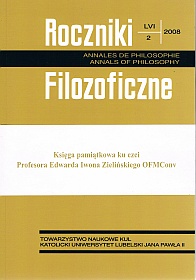Antonius Andreae – the First Scotist
Abstract
Antonius Andreae (ca 1280 – ca 1333) is an important figure in the early development of Scotist school but also an obscure one, known mostly for his professed fidelity to the doctrine of his Parisian teacher, John Duns Scotus. The analysis of his surviving texts reveals (scant) information that allows for establishing a chronology of his most important works: De tribus principiis naturae, the commentary on the Metaphysics, the commentary on the Ars Vetus, and the Abbreviatio operis oxoniensis Scoti, as well as a (partial) reconstruction of his academic life after the return to his native Aragon from Paris. It also shows Antonius as a fierce opponent of Peter Auriol, whose views he finds to be especially repugnant to the teaching of Scotus.
References
Bakker P. J. J. M. & Dekker D. J.: Antoine Andrée ou Jean le Chanoine? A propos de l’authenticité du commentaire de la Physique conservé dans le ms. Cambridge, Gonville & Caius College 368 (590), „Bulletin de la philosophie médiévale” 42 (2000), s. 101-103.
Balić Ch.: De critica textuali scholasticorum sciptis accomodata, „Antonianum” 20 (1945), s. 280-292.
Bérubé C.: Critique de l’Avicennisme Augustinisant, [w:] Acta IV Congressus Scotistici Internationalis, Oxoniae 1966, t. 1, Roma 1968, s. 202-228.
Bérubé C.: Antoine André, témoin et interprète de Scot, „Antonianum” 54 (1979), s. 386-446.
Bérubé C.: La première Ecole Scotiste, [w:] Preuve et Raisons à l’Université de Paris, ed. Z. Kaluza & P. Vigneaux, Paris 1984, s. 9-24.
Carreras y Artau J.: Notas sobre el escotismo medieval en la provincia franciscana de Aragón, „Antonianum” 40 (1965), s. 463-490.
Carreras y Artau T. & J.: Historia de la filosofia española, t. 2, Madrid 1943, s. 466-467.
Cenci C.: Bibliotheca manuscripta ad Sacrum Conventum Assisiensem, Assisi 1981.
D’Ors A.: Utrum nomen significet rem vel passionem in anima, „Archives d’histoire doctrinale et littéraire du moyen age” 62 (1995), s. 7-35.
Gensler M.: Catalogue of the works by or ascribed to Antonius Andreae, „Mediaevalia Philosophica Polonorum” 31 (1992), s. 147-155.
Gensler M.: Two Quaestiones Concerning the Subject-Matter of Physics, [w:] Aristotle in Britain in the Middle Ages, ed. J. Marenbon, Turnhout 1996, s. 195-209
Lohr Ch.: Medieval Latin Aristotle Commentaries, „Traditio” 23 (1967), s. 343-385.
Maier A.: Literarhistorische Notizen über Petrus Aureoli, Durandus und den „Cancellarius”, „Gregorianum” 21 (1948), s. 212-241.
Marti de Barcelona P.: Fra Antoni Andreu, O.M., doctor dulcifluus, „Criterion” 1929, s. 321-346.
Pini G.: Una lettura scotista della Metafisica di Aristotele: l’Expositio in libros Metaphysicorum di Antonio Andrea, „Documenti e studi sulla tradizione filosofica medievale” II, 2 (1991), s. 531-541.
Sanahuja P.: Historia de la seráfica provincia de Cataluña, Barcelona 1959.
Sbaralea G.: Supplementum ad „Scriptores trium ordinum” S. Francisci, Roma 1806.
Vazquez Janeiro I.: Rutas e hitos del escotismo primitivo en España, [w:] Acta V Congressus Scotistici Internationalis, Salamanticae 1981, Roma 1984, s. 426-450.
Weijers O.: Le travail intellectuel à la Faculté des arts de Paris: textes et maîtres, Turnhout 1994.
Copyright (c) 2008 Roczniki Filozoficzne

This work is licensed under a Creative Commons Attribution-NonCommercial-NoDerivatives 4.0 International License.





